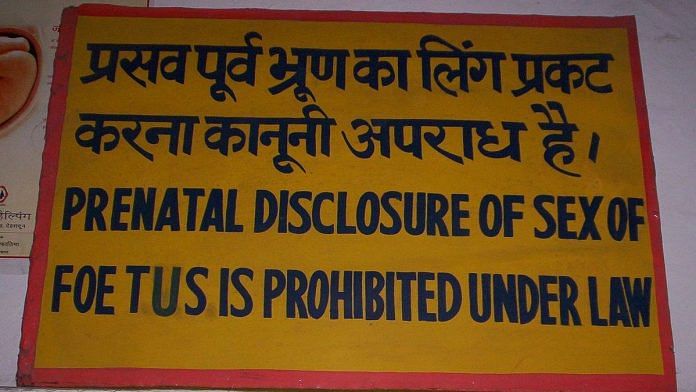New Delhi: A notification issued last week by the Ministry of Health and Family Welfare, suspending certain rules under the law that prohibit sex determination in India, has sparked outrage and drawn censure from several activists for ‘diluting’ the law, but the government and doctors insist this won’t be the case.
The notification, dated 4 April, suspends rules 8, 9(8), and 18A(6) of the Pre-Conception and Pre-Natal Diagnostic Techniques Act, 1994, (PCPNDT Act). All these rules are to do with certain administrative procedures, “in view of the emergency situation arisen due to pandemic Covid-19, whereby entire country has been put on lockdown”, the notification states.
However, the All India Democratic Women’s Association, the women’s wing of the Communist Party of India (Marxist), put out a statement saying the suspension “goes against the main purpose of the act to stop sex selection by means of certain basic and vital compliances that genetic labs and clinics etc have to follow in keeping records and submitting these for scrutiny to the appropriate authority and for re-registration”.
CPI(M) leader Brinda Karat wrote a letter to Union Health Minister Harsh Vardhan saying the notification “could be misused by unscrupulous sections to conduct sex determination tests freely”.
However, health ministry officials as well as gynaecologists told ThePrint the notification will not dilute the spirit or application of the law in any form, and that sex determination is still strictly prohibited.
The ministry, on Thursday evening, issued a clarification, saying the suspension of the three rules doesn’t mean the suspension of the PCPNDT Act, which prohibits sex selection before or after conception.
Also read: Rajasthan’s districts with worst child sex ratio are improving — one step at a time
What the notification entails
Rule 8 of the PCPNDT Act has to do with the re-registration of genetic and ultrasound clinics whose licences are due to expire. According to the new notification, those labs seeking a renewal of their licences will not be allowed to do so until 30 June. Licences are valid for five years.
Rule 18A(6), meanwhile, requires all appropriate authorities to submit a quarterly report to the government, as well as maintain records of all licenced practitioners under the law.
“The norm is that you apply for a licence renewal three months before it is set to expire. The new notification delays this to a later date. In other words, only some time-sensitive formal requirements have been delayed,” said Dr Jaydeep Tank, secretary of the Federation of Obstetric and Gynaecological Societies of India (FOGSI).
“It doesn’t mean this section has been revoked or no longer applies,” he added.
The third rule to be affected by the notification, rule 9(8), requires genetic and ultrasound clinics to submit a detailed report of pre-conception or pregnancy-related procedures and tests it has carried out to the appropriate authority — usually a district medical officer — by the 5th of every month.
“It doesn’t mean that the clinics do not have to maintain the records… We are just deferring the date of submission of the records until 30 June,” explained a senior official at the health ministry.
“It is very clear that clinics still have to maintain their records. In fact, under the PCPNDT law, they are expected to maintain the records for two years, so authorities can still examine the records after 30 June.”
The official also said since all the district health authorities are busy fighting the Covid-19 medical emergency, there is no one who can process the documentation at present.
Certain states and districts also have mechanisms by which the records can be submitted online.
Also read: Haryana has not only fought its female foeticide but is also helping Punjab’s girls live
Doctors’ take
Dr Ashutosh Gupta, who runs a genetic clinic and ultrasound facility in Delhi, agreed that the government’s notification would only change administrative procedures, and won’t affect the ban on sex determination in India.
“The sections mentioned only refer to certain administrative tasks that would be difficult and time-consuming to do given the lockdown is in place,” Gupta told ThePrint.
“It doesn’t change women’s access to contraception and abortion, and doesn’t mean compliances will be overlooked,” he said.
Mumbai-based gynaecologist Dr Nikhil Datar agreed. “My clinic’s registration was due for renewal in April and I was wondering how will I do it considering the lockdown,” he said, explaining that the process of renewal requires an affidavit as well as submitting of documents at the local health office — in his clinic’s case, the Brihanmumbai Municipal Corporation.
“The current suspension merely means that clinics that are registered can continue to provide services without halt,” Datar said.
Sex determination in India
The anxiety around the possible dilution of the Act’s stringent protocols is rooted in the prevalence of sex-selective abortions in India. According to the 2011 census, 940 females are born for every 1,000 males in the county.
Quoting government data, a 2018 report by The Guardian said “63 million women are ‘missing’ statistically across India, and more than 21 million girls are unwanted by their families”.
The PCPNDT Act was enforced in 1994 as a means to outlaw and reduce the number of sex-selective abortions and female foeticide. In 2003, it was amended to bring ultrasonography within its ambit as a means of sex determination.
Also read: How Punjabi ideas of honour lead to girl-shaming and prenatal sex selection in Canada




The women’s wing of the Communist Party of India (Marxist) seems too busy in searching for non existing problems to target the government. Egg on its face now!